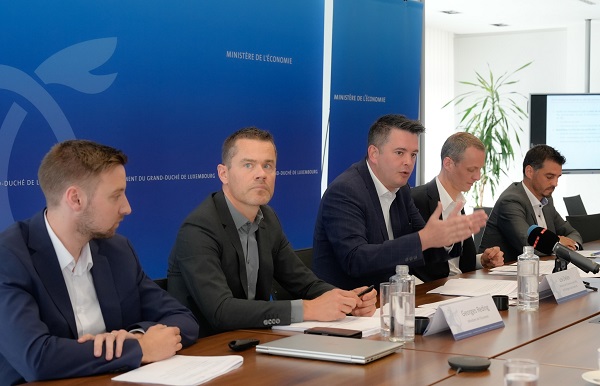 (L-R) Ben Reiser, Ministry of Economy; Georges Reding, Ministry of Economy; Lex Delles, Minister of Economy, SMEs, Energy & Tourism; Serge Wilmes, Minister of Environment, Climate & Biodiversity; Gilles Biver, Ministry of Environment;
Credit: MECO
(L-R) Ben Reiser, Ministry of Economy; Georges Reding, Ministry of Economy; Lex Delles, Minister of Economy, SMEs, Energy & Tourism; Serge Wilmes, Minister of Environment, Climate & Biodiversity; Gilles Biver, Ministry of Environment;
Credit: MECO
On Friday 16 May 2025, Luxembourg's Minister of the Economy, SMEs, Energy and Tourism, Lex Delles, and the Minister of the Environment, Climate and Biodiversity, Serge Wilmes, presented 51 concrete measures resulting from the national consultation on energy: "Einfach - Séier - Erneierbar" (meaning "simple, fast, renewable").
As reported by Luxembourg's Ministry of the Economy and the Ministry of the Environment, Climate and Biodiversity, the national consultation is aimed at accelerating and simplifying the deployment of renewable energy in Luxembourg to strengthen resilience and contribute to climate protection; Prime Minister Luc Frieden announced the consultation back in June 2024 and it was subsequently conducted with key stakeholders in the energy sector on renewable energy.
This initiative established an ongoing national dialogue, reportedly leading to the consolidation of Luxembourg's increased energy independence. This collaborative effort, facilitated by the Klima-Agence, brought together various stakeholders, including representatives of relevant ministries and public authorities, renewable energy project leaders, as well as representatives from the Luxembourg Chamber of Commerce, the Chamber of Skilled Trades and Crafts, FEDIL, the Fédération des Artisans, the Syvicol union of Luxembourg towns and municipalities and the Order of Architects and Consulting Engineers (OAI).
Minister Delles welcomed the measures resulting from the consultation, saying: "This process has made it possible to collectively arrive at solutions aimed at strengthening Luxembourg's energy sovereignty and increasing resilience at both the national and individual levels in the face of international conflicts and fluctuations in the energy market. The 51 measures developed offer citizens and businesses concrete opportunities to contribute to increasing national renewable energy production."
Through faster and simplified procedures, as well as various incentives, the measures resulting from the national consultation are expected to benefit all consumers, from individuals to large companies, while facilitating a transition with the least impact on people and the environment. Minister Wilmes emphasised: "Each of these initiatives is part of a comprehensive approach aimed at protecting natural ecosystems, respecting climate commitments and promoting quality of life for all. Biodiversity, climate and quality of life are inseparable - each element impacts the others."
Summary of measures
Simplified and digitalised procedures: these measures include reducing processing times, improving guidance with a single point of contact and clarifying environmental requirements. In addition, the increased digitalisation of procedures and the repeal of certain permits at the municipal level are said to "significantly simplify" the project approval process.
Land mobilisation: the ministries described land availability as a major issue for the development of renewable energy. Initiatives aimed at maximising the use of available space include the continuation of Agri-PV, the development of areas along highways and the proximity of wind turbines to roads and industrial zones. Furthermore, regulatory adjustments are expected to allow for the optimised installation of wind turbines and photovoltaic panels
Citizen participation and the role of municipalities: measures are being put in place to strengthen information and awareness. The establishment of dedicated contact points and the integration of more accessible data via the Géoportail aim to better support individuals and project developers. The roles of the Klima-Agence and the Urban Planning and Environment Facilitation Unit (CFUE) will be strengthened in this context.
Enhanced financial assistance: pre-financing of Klimabonus assistance reportedly allows for the rapid processing of applications, while improvements are being made to support schemes for municipalities, cooperatives and affordable housing.
Strengthening the electricity grid: measures aim to ensure transparent allocation of grid capacity and to facilitate the sharing and storage of renewable electricity.
The ministries noted that a number of measures are already being transposed, whether through legislation, regulation or administrative means. To date, eleven of the 51 measures are fully or partially in the implementation phase. Furthermore, more than half of the measures (26 of the 51) will be introduced, in full or in part, through a legislative or regulatory process, or implemented before summer 2025.
Minister Wilmes stated: "Accelerating the development of renewable energy is a priority in the context of climate protection and we must act effectively. Since the national consultation, we have worked actively to implement several of the announced measures. We remain committed to supporting individuals and businesses in their contribution to climate objectives through a number of digitalised, clear and simple administrative procedures."
The two ministers elaborated: "Thanks to this package of ambitious measures, the regulatory and administrative framework is significantly simplified to facilitate the development of renewable energy in Luxembourg, further unlock its potential and make our country a pioneer in renewable energy." They stressed that individuals are at the centre of a range of measures, whether through the simplification of authorisation procedures, the simplification of the rules to be respected regarding photovoltaic installations for protected buildings or more targeted information via simulation tools of self-consumption possibilities. Increased information will be available on opportunities for sharing electricity, and electricity storage for existing photovoltaic installations will be encouraged, while accelerating and simplifying the financing of installations with the pre-financing system (third-party payment).
"These advances are fully in line with the government's desire to promote an efficient, rapid and accessible energy transition for all, while guaranteeing increased sovereignty and strengthened resilience in the face of global challenges," concluded Minister Delles.








